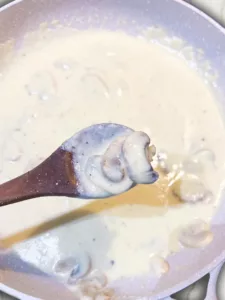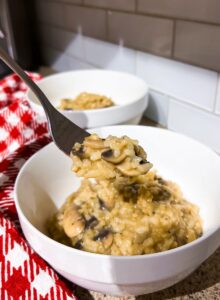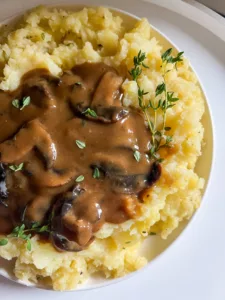Introduction: How To Rehydrate Dried Mushrooms
You might be wondering how do you rehydrate mushrooms. Dried mushrooms are a culinary treasure, offering a rich, concentrated flavor that can elevate any dish. Rehydrating them correctly is essential to unlocking their full potential. This guide will walk you through everything you need to know about rehydrating dried mushrooms, ensuring you get the best results every time.
If you’re interested in plant-based mushroom recipes, feel free to explore my complete Vegan Mushroom Recipes Collection here.
Benefits of Using Dried Mushrooms
Longer Shelf Life
Dried mushrooms have a significantly longer shelf life compared to their fresh counterparts. Properly stored, they can last for months, making them a pantry staple.
Intense Flavor
The drying process intensifies the natural flavors of mushrooms, providing a deep, earthy taste that enhances a variety of dishes.
Versatility in Cooking
From soups and stews to pasta and risottos, dried mushrooms can be used in a wide range of recipes, adding a unique depth of flavor.
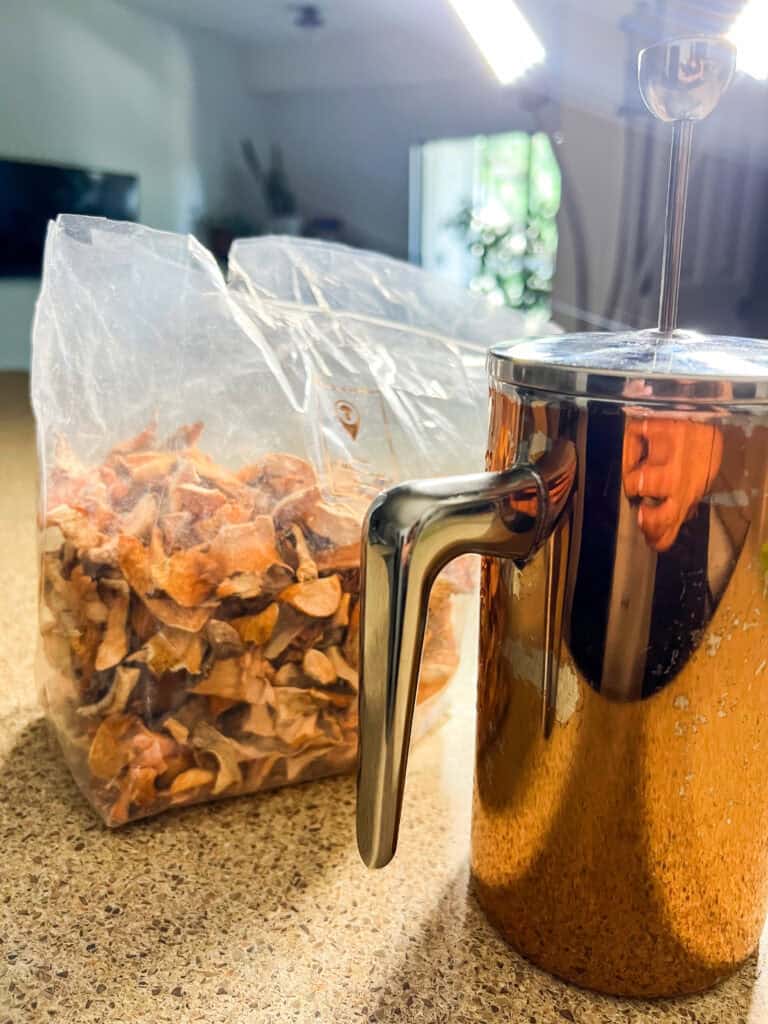
Types of Dried Mushrooms
Porcini
Known for their nutty and earthy flavor, porcini mushrooms are a favorite in Italian cuisine.
Shiitake
With their meaty texture and rich umami taste, shiitake mushrooms are widely used in Asian dishes.
Morel
Morels have a distinctive honeycomb appearance and a delicate, earthy flavor, making them a gourmet delight.
Chanterelle
These golden mushrooms are prized for their fruity aroma and slightly peppery taste.
Black Trumpet
Black trumpet mushrooms are known for their smoky, rich flavor, adding depth to various dishes.
Oyster
Oyster mushrooms have a mild, delicate flavor and a velvety texture, making them versatile for a variety of dishes.
Lion’s Mane
Lion’s Mane mushrooms are not only known for their unique, fluffy appearance but also for their seafood-like texture and slightly sweet flavor.
Maitake
Also known as hen-of-the-woods, maitake mushrooms have a robust, earthy flavor and a texture that stands up well in cooking.
Enoki
Enoki mushrooms are slender and delicate with a mild flavor, often used in Asian soups and salads.
Preparing to Rehydrate Mushrooms
Gathering Necessary Tools To Rehydrate Dried Mushrooms
To rehydrate dried mushrooms, you’ll need a bowl or a French press, warm water, and a strainer.
Choosing the Right Water Temperature
Warm water, around 120°F (49°C), is ideal for rehydrating mushrooms. Too hot, and you risk compromising their texture; too cold, and the process will take longer.
Step-by-Step Guide on Rehydrating Mushrooms
Using a French Press
Place the dried mushrooms in the French press.
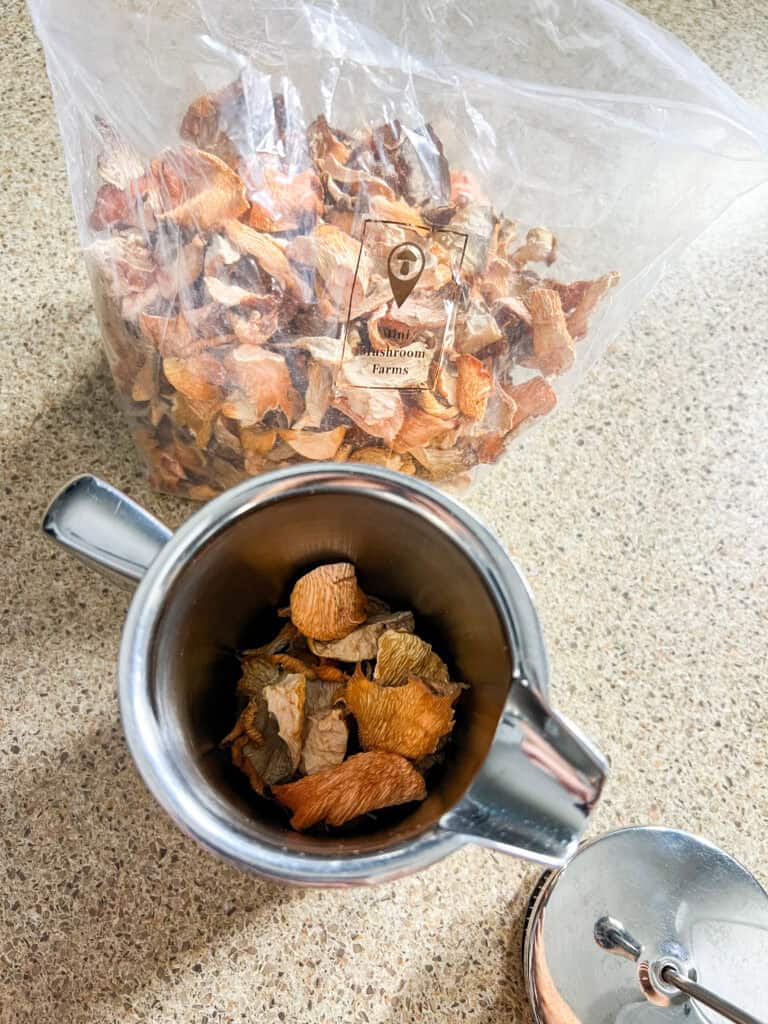
Pour warm water over the mushrooms until they are fully submerged.
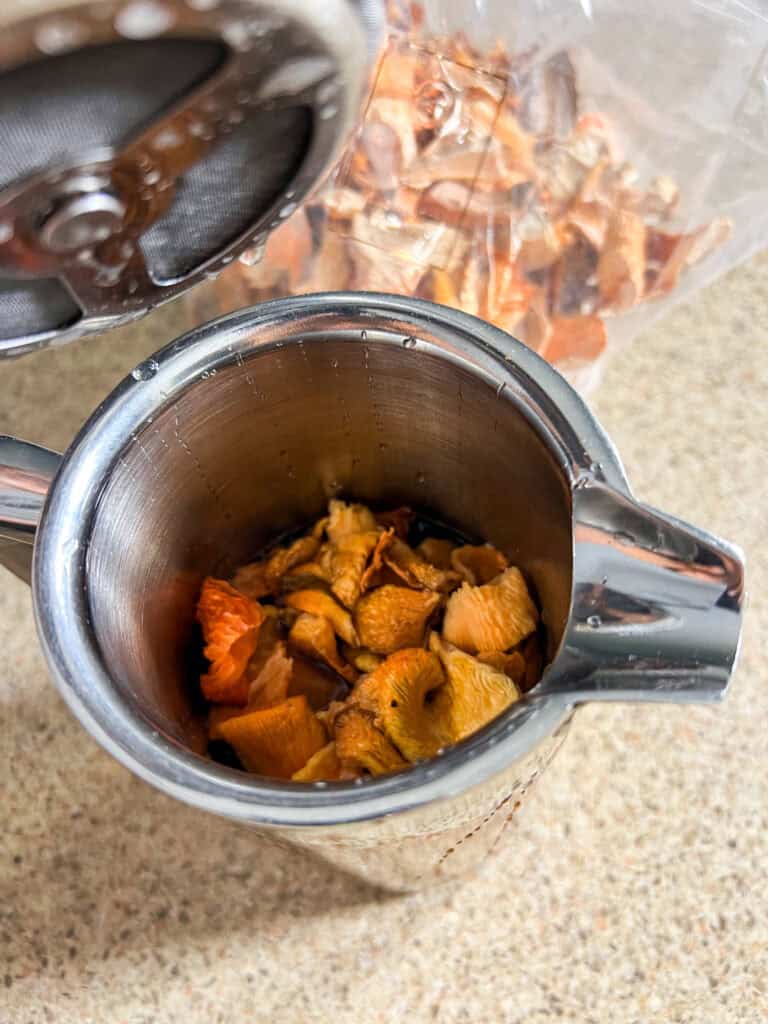
Let them soak for 20-30 minutes.
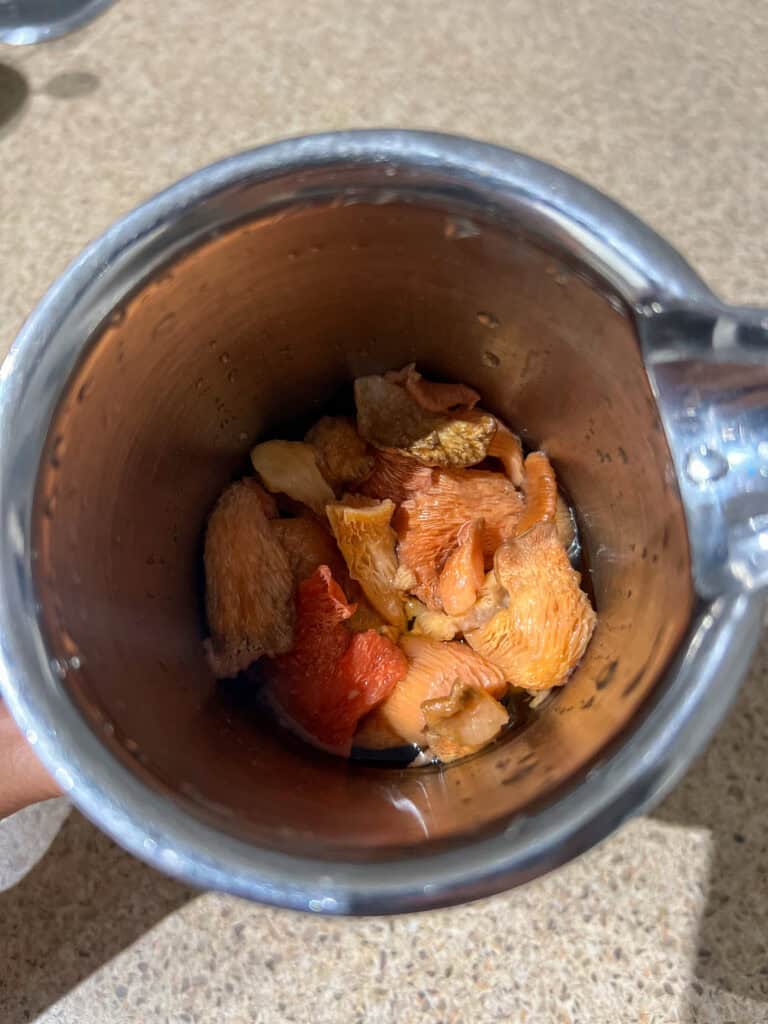
Press down the plunger and strain the mushrooms. Remember to save the water, now transformed into a flavorful mushroom broth.
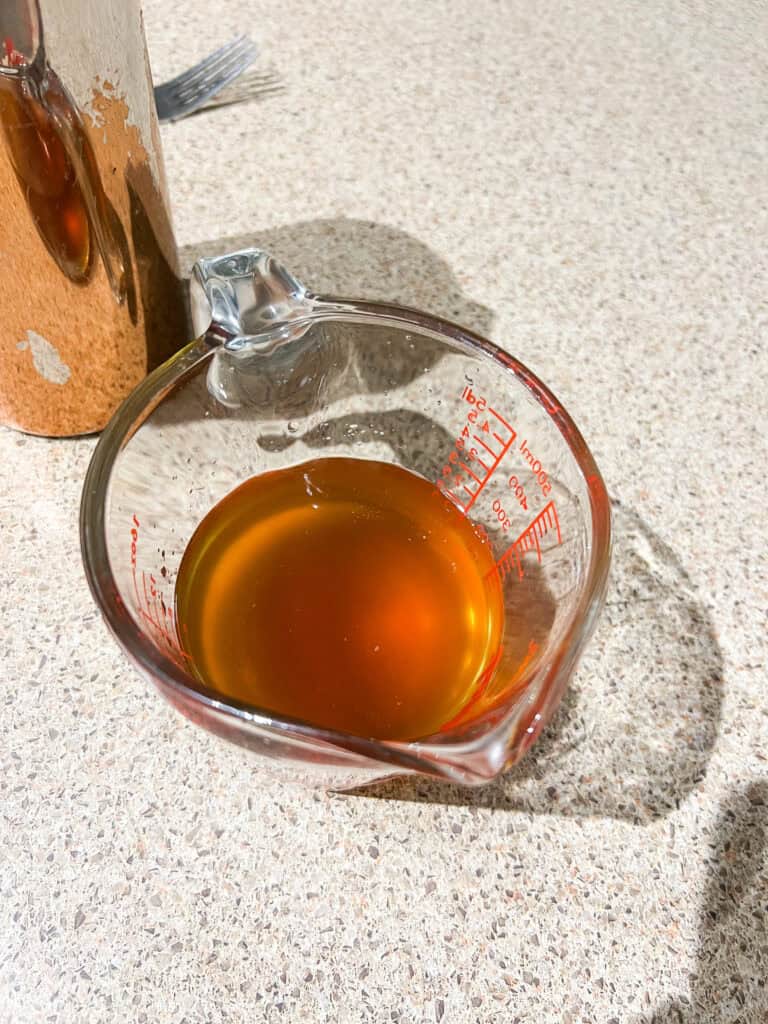
Soaking in Warm Water
- Place the mushrooms in a bowl.
- Cover them with warm water.
- Let them soak for 20-30 minutes.
- Drain and use as needed.
Watch My Video on How To Rehydrate Dried Mushrooms Below Easily
Alternative Methods To Rehydrate Dried Mushrooms
Microwave
- Place the mushrooms in a microwave-safe bowl.
- Add warm water.
- Microwave on high for 1-2 minutes.
- Let them sit for a few minutes before draining.
Stove
- Bring a pot of water to a gentle simmer.
- Remove from heat and add the mushrooms.
- Cover and let them soak for 20-30 minutes.
- Drain and use as needed.
Chart: Rehydration Times for Different Dried Mushrooms
| Mushroom Type | Soaking Time |
|---|---|
| Porcini | 20-30 minutes |
| Shiitake | 20-30 minutes |
| Morel | 20-30 minutes |
| Chanterelle | 20-30 minutes |
| Black Trumpet | 20-30 minutes |
| Oyster | 20-30 minutes |
| Lion’s Mane | 20-30 minutes |
| Maitake | 20-30 minutes |
| Enoki | 20-30 minutes |
Tips for Perfectly Rehydrated Mushrooms
Checking for Doneness
Mushrooms should be soft and pliable. If they are still tough, let them soak a bit longer.
Using the Soaking Liquid
The soaking liquid is full of flavor and can be used in your recipes. Strain it to remove any grit before use.
Storing Rehydrated Mushrooms
If you’re not using them immediately, store rehydrated mushrooms in the fridge for up to 3 days.
Common Mistakes to Avoid When Rehydrating Dried Mushrooms
Over-soaking
Soaking mushrooms for too long can make them mushy. Stick to the recommended times.
Using Boiling Water
Boiling water can damage the mushrooms’ texture. Use warm water instead.
Discarding the Soaking Liquid
The soaking liquid is a flavor bomb. Don’t throw it away—use it in your cooking!
Cooking with Rehydrated Mushrooms
Adding to Soups and Stews
Rehydrated mushrooms are perfect for soups and stews, adding depth and richness.
Incorporating into Pasta Dishes
Toss rehydrated mushrooms with pasta for a quick and delicious meal.
Using in Risottos
Mushrooms are a classic addition to risotto, providing a hearty, earthy flavor.
Enhancing Flavors with Rehydrated Mushrooms
Combining with Fresh Mushrooms
Mix rehydrated and fresh mushrooms for a blend of textures and flavors.
Pairing with Herbs and Spices
Thyme, rosemary, and garlic pair beautifully with rehydrated mushrooms.
Nutritional Benefits of Mushrooms
Rich in Vitamins and Minerals
Mushrooms are a great source of B vitamins, selenium, and potassium.
Low in Calories and Fat
They are also low in calories and fat, making them a healthy addition to any diet.
Rehydrating Mushrooms for Specific Cuisines
Italian
Porcini mushrooms are a staple in Italian cuisine, perfect for pasta and risotto.
Asian
Shiitake mushrooms are widely used in Asian dishes like stir-fries and soups.
French
Morels and chanterelles are often featured in French cuisine, adding a gourmet touch to dishes.
Creative Recipes with Rehydrated Mushrooms
Mushroom Risotto
A creamy, delicious risotto with rehydrated mushrooms.
Shiitake Stir-Fry
A quick and easy stir-fry with shiitake mushrooms, vegetables, and soy sauce.
Porcini Pasta
A rich and flavorful pasta dish with rehydrated porcini mushrooms.
If you’re interested in more plant-based mushroom recipes, feel free to explore my complete Vegan Mushroom Recipes Collection here.
Frequently Asked Questions (FAQs): Rehydrate Mushrooms
How long can I store rehydrated mushrooms?
Rehydrated mushrooms can be stored in the fridge for up to 3 days.
Can I reuse the soaking liquid?
Yes, the soaking liquid is full of flavor and can be used in your recipes.
Do rehydrated mushrooms taste different from fresh mushrooms?
Rehydrated mushrooms have a more intense flavor than fresh mushrooms.
Are there any mushrooms that should not be rehydrated?
Most mushrooms can be rehydrated, but some, like fresh truffles, are best used fresh.
Can I rehydrate mushrooms in broth instead of water?
Yes, using broth can add even more flavor to the mushrooms.
Conclusion: How Do You Rehydrate Mushrooms
Rehydrating dried mushrooms is a simple process that can greatly enhance your cooking. Whether you’re making a hearty soup, a creamy risotto, or a quick stir-fry, rehydrated mushrooms add a depth of flavor that’s hard to beat. With the tips and techniques outlined in this guide, you’ll be able to rehydrate and cook with dried mushrooms like a pro. Thanks to Mini Mushroom Farms for providing these beautiful dried lion’s mane mushrooms.

